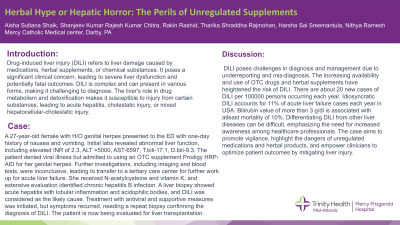Monday Poster Session
Category: Liver
P2499 - Herbal Hype or Hepatic Horror: The Perils of Unregulated Supplements
Monday, October 23, 2023
10:30 AM - 4:15 PM PT
Location: Exhibit Hall

Has Audio

Aisha Sultana Shaik, MD
Mercy Catholic Medical Center
Yeadon, Pennsylvania
Presenting Author(s)
Aisha Sultana Shaik, MD1, Shanjeev Kumar Rajeshkumar Chitra, MD2, Rakin Rashid, MD2, Tharika Shraddha, MD2, Harsha Sai Sreemantula, MD2, Nithya Ramesh, MD2
1Mercy Catholic Medical Center, Yeadon, PA; 2Mercy Catholic Medical Center, Darby, PA
Introduction: Drug-induced liver injury (DILI) refers to liver damage caused by medications, herbal supplements, or chemical substances. It poses a significant clinical concern, leading to severe liver dysfunction and potentially fatal outcomes. DILI is complex and can present in various forms, making it challenging to diagnose. The liver's role in drug metabolism and detoxification makes it susceptible to injury from certain substances, leading to acute hepatitis, cholestatic injury, or mixed hepatocellular-cholestatic injury.
Case Description/Methods: A 27-year-old female with H/O genital herpes presented to the ED with one-day history of nausea and vomiting. Initial labs revealed abnormal liver function, including elevated INR of 2.3, ALT >5000, AST-6597, T.bili-17.1, D.bili-9.3. The patient denied viral illness but admitted to using an OTC supplement Prodigy HRP-AID for her genital herpes. Further investigations, including imaging and blood tests, were inconclusive, leading to transfer to a tertiary care center for further work up for acute liver failure. She received N-acetylcysteine and vitamin K, and extensive evaluation identified chronic hepatitis B infection. A liver biopsy showed acute hepatitis with lobular inflammation and acidophilic bodies, and DILI was considered as the likely cause. Treatment with antiviral and supportive measures was initiated, but symptoms recurred, needing a repeat biopsy confirming the diagnosis of DILI. The patient is now being evaluated for liver transplantation.
Discussion: DILI poses challenges in diagnosis and management due to underreporting and misdiagnosis.The increasing availability and use of OTC drugs and herbal supplements have heightened the risk of DILI. There are about 20 new cases of DILI per 100000 persons occurring each year. Idiosyncratic DILI accounts for 11% of acute liver failure cases each year in USA. Bilirubin value of more than 3 g/dl is associated with atleast mortality of 10%. Differentiating DILI from other liver diseases can be difficult, emphasizing the need for increased awareness among healthcare professionals. The case aims to promote vigilance, highlight the dangers of unregulated medications and herbal products, and empower clinicians to optimize patient outcomes by mitigating liver injury.
Disclosures:
Aisha Sultana Shaik, MD1, Shanjeev Kumar Rajeshkumar Chitra, MD2, Rakin Rashid, MD2, Tharika Shraddha, MD2, Harsha Sai Sreemantula, MD2, Nithya Ramesh, MD2. P2499 - Herbal Hype or Hepatic Horror: The Perils of Unregulated Supplements, ACG 2023 Annual Scientific Meeting Abstracts. Vancouver, BC, Canada: American College of Gastroenterology.
1Mercy Catholic Medical Center, Yeadon, PA; 2Mercy Catholic Medical Center, Darby, PA
Introduction: Drug-induced liver injury (DILI) refers to liver damage caused by medications, herbal supplements, or chemical substances. It poses a significant clinical concern, leading to severe liver dysfunction and potentially fatal outcomes. DILI is complex and can present in various forms, making it challenging to diagnose. The liver's role in drug metabolism and detoxification makes it susceptible to injury from certain substances, leading to acute hepatitis, cholestatic injury, or mixed hepatocellular-cholestatic injury.
Case Description/Methods: A 27-year-old female with H/O genital herpes presented to the ED with one-day history of nausea and vomiting. Initial labs revealed abnormal liver function, including elevated INR of 2.3, ALT >5000, AST-6597, T.bili-17.1, D.bili-9.3. The patient denied viral illness but admitted to using an OTC supplement Prodigy HRP-AID for her genital herpes. Further investigations, including imaging and blood tests, were inconclusive, leading to transfer to a tertiary care center for further work up for acute liver failure. She received N-acetylcysteine and vitamin K, and extensive evaluation identified chronic hepatitis B infection. A liver biopsy showed acute hepatitis with lobular inflammation and acidophilic bodies, and DILI was considered as the likely cause. Treatment with antiviral and supportive measures was initiated, but symptoms recurred, needing a repeat biopsy confirming the diagnosis of DILI. The patient is now being evaluated for liver transplantation.
Discussion: DILI poses challenges in diagnosis and management due to underreporting and misdiagnosis.The increasing availability and use of OTC drugs and herbal supplements have heightened the risk of DILI. There are about 20 new cases of DILI per 100000 persons occurring each year. Idiosyncratic DILI accounts for 11% of acute liver failure cases each year in USA. Bilirubin value of more than 3 g/dl is associated with atleast mortality of 10%. Differentiating DILI from other liver diseases can be difficult, emphasizing the need for increased awareness among healthcare professionals. The case aims to promote vigilance, highlight the dangers of unregulated medications and herbal products, and empower clinicians to optimize patient outcomes by mitigating liver injury.
Disclosures:
Aisha Sultana Shaik indicated no relevant financial relationships.
Shanjeev Kumar Rajeshkumar Chitra indicated no relevant financial relationships.
Rakin Rashid indicated no relevant financial relationships.
Tharika Shraddha indicated no relevant financial relationships.
Harsha Sai Sreemantula indicated no relevant financial relationships.
Nithya Ramesh indicated no relevant financial relationships.
Aisha Sultana Shaik, MD1, Shanjeev Kumar Rajeshkumar Chitra, MD2, Rakin Rashid, MD2, Tharika Shraddha, MD2, Harsha Sai Sreemantula, MD2, Nithya Ramesh, MD2. P2499 - Herbal Hype or Hepatic Horror: The Perils of Unregulated Supplements, ACG 2023 Annual Scientific Meeting Abstracts. Vancouver, BC, Canada: American College of Gastroenterology.
